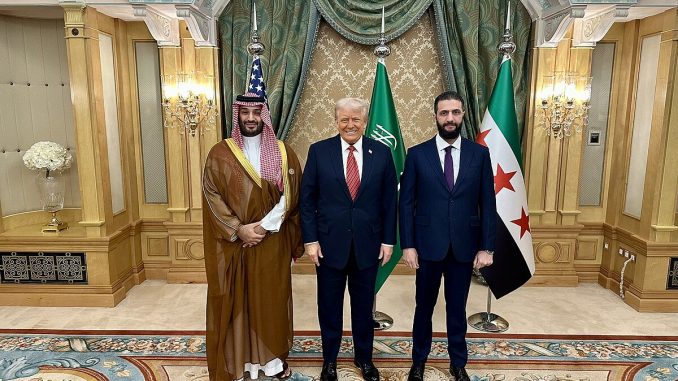Peloni: Another example of failing attempts of peace thru strength in the face of Arab impudence. Making demands which are not met requires immediate and strong responses, this is the very kernel of what might be described as peace thru strength. Failing to respond to such demands as releasing all of the hostages on day one of his term, or on holding Iran directly responsible for Houthi attacks which persisted nonetheless, have led to regional actors taking Trump’s threats as being insincere, and finding that their presumptions, thus far at least, are correct, as is the situation with Al Jolani who has a 6 month reprieve during which he will will continue to receive sanction relief while ignoring Trump’s demands to rid Syria of foreign fighters. At the same time, Israel is reported to being pushed to make peace with Syria and abandon the Druze, thus giving this Turkish proxy all the benefits he needs to consolidate power during the six month period of US impotence. As Sharawi noted, Trump should reimpose the sanctions due to Jolani’s insolence, but in addition he should simultaneously have the Israelis withdraw from any peace talks as well. Bringing pressure to bear is the strength aspect thru which peace might be pursued. Otherwise it is just rhetorical bluster from which only allies might have to fear any serious consequences.
Ahmad Sharawi | May 20, 2025
 President Donald Trump with Saudi Crown Prince Mohammed Bin Salman and President of Syria Ahmed al-Sharaa during Donald Trump’s state visit to Saudi Arabia. (Photo by White House – Karoline Leavitt in X, Public Domain)
President Donald Trump with Saudi Crown Prince Mohammed Bin Salman and President of Syria Ahmed al-Sharaa during Donald Trump’s state visit to Saudi Arabia. (Photo by White House – Karoline Leavitt in X, Public Domain)
“Tell all foreign terrorists to leave Syria,” President Donald Trump told interim leader Ahmad al-Sharaa in Riyadh on May 14 — just after lifting all U.S. sanctions on Syria. Yet on May 18, Syria’s Defense Ministry welcomed the Turkistan Islamic Party (TIP), an al-Qaeda-linked Uyghur jihadist group active in Afghanistan and Syria, into Sharaa’s new army. The development suggests that Syria’s new leader remains unwilling to align his policy with U.S. interests and values.
The United States previously made the removal of foreign fighters a top condition for sanctions relief following the fall of the Assad regime in December 2024. In March 2025, Washington sent a formal letter to the new government in Damascus demanding the expulsion of these fighters. Syria’s response was to stall, arguing that “non-Syrian rebels who helped oust Assad should be treated well.” During a joint conference with French President Emmanuel Macron, Sharaa defended their presence, saying, “foreign fighters came to Syria individually, not in groups, to support the Syrian people during the revolution.” He has also indicated plans to naturalize them.
Al-Qaeda-Linked Fighters From TIP Join Syria’s New Army
The incorporation of TIP into the Syrian military followed Syrian Defense Minister Murhaf Abu Qasra’s announcement that “all major armed factions had now been integrated into the defense ministry.” The military’s 84th Division, where TIP now resides, will consist primarily of Uyghurs and other foreign fighters. The identity of its leadership and area of operations remain unclear.
TIP has a long-standing alliance with al-Qaeda, fighting alongside it in Afghanistan since before 2001. Its current emir, Abdul Haq al-Turkistani, sits on al-Qaeda’s central Shura Council. In 2015, TIP desecrated churches in Jisr al-Shughur in Idlib, according to multiple reports. Yet TIP’s commander in Syria, Abdulaziz Dawud Hudaberdi, also known as Zahid, was one of six foreign fighters promoted by Sharaa to the rank of brigadier general in December 2024.
U.S.-Sanctioned, Pro-Turkish Commanders Lead Syrian Army Units
In an effort to unify all factions under a central command, Sharaa has also integrated elements of the Turkish-backed Syrian National Army (SNA) into the new Syrian military. These units include figures sanctioned by the United States for atrocities against the Kurds — yet Sharaa appointed them to senior posts.
Mohammad al-Jasem, leader of the SNA’s Sultan Suleiman Shah Brigade, now commands the Syrian military’s Hama Division. Sayf Abu Bakr, a former ISIS fighter and head of the SNA’s Hamza Division, was named commander of the 76th Division. Ahmad al-Hayes — known as Abu Hatem Shaqra, whom Washington sanctioned for ISIS ties and human rights abuses against the Kurds — now leads the 86th Division in Deir ez-Zor, Hasakah, and Raqqa.
Sharaa also failed to act against SNA units during their March attacks against Alawite communities on the Syrian coast. Multiple sources confirmed that fighters from al-Jasem’s Suleiman Shah Brigade and Abu Bakr’s Hamza Division took part in the massacres. While there is no evidence that Sharaa ordered the attacks, his failure to prevent or punish them showcases his lack of control over these factions.
U.S. Should Reimpose Sanctions if Syria Fails to Act
Although President Trump lifted all sanctions, Secretary of State Marco Rubio subsequently said that waivers will be “renewed every 180 days.” The United States must monitor Syria’s military integration closely and take swift action if Sharaa continues down his current path. Washington should either pause the waivers if Sharaa ignores U.S. demands or include a snapback mechanism with the waivers that automatically reimposes sanctions if foreign fighters are not expelled.
Ahmad Sharawi?is a research analyst at the Foundation for Defense of Democracies (FDD), where he focuses on Middle East affairs, specifically the Levant, Iraq, and Iranian intervention in Arab affairs, as well as U.S. foreign policy toward the region. For more analysis from Ahmad and FDD, please subscribe?HERE. Follow Ahmad on X?@AhmadA_Sharawi. Follow FDD on X?@FDD. FDD is a Washington, DC-based, nonpartisan research institute focusing on national security and foreign policy.



Leave a Reply
You must be logged in to post a comment.